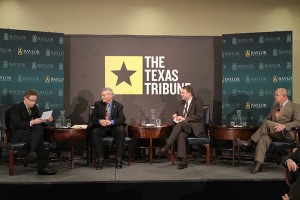

Matt Hellman
By Taylor Rexrode
Staff Writer
The Hot Seat series brought together Wacoans and Texas officials to discuss the 83rd legislative session last Saturday.
The forum let any topic be brought to the table, but much of the discussion with state officials revolved around the heated topic of education.
The series was presented by the Texas Tribune and hosted in the Stone Room of the Ferrell Center.
Evan Smith, Editor in Chief and CEO of Texas Tribune, moderated the event, asking questions of State Sen. Brian Birdwell and State Rep. Kyle Kacal and State Rep. Charles Anderson, all republicans.
The Texas public education system has been a controversial issue within the past few years. After the Republican-controlled Texas Legislature cut $5.4 billion in public education and grant programming in 2011, around 600 school districts filed a lawsuit to prove schools were inadequately funded under the state constitution. A judge ruled the budget cuts were unconstitutional, but the state plans to appeal, meaning that there may not be a resolution until 2014.
In the meantime, Wacoans who saw school closures in Waco ISD asked their representatives for answers about where the Texas education system is heading.
Kacal opted to focus on what would happen in the session instead of what is uncertain in education.
“Obviously, we have an issue,” Kacal said. “The responsible thing for us to do is wait. It would be crazy to jump out there. We need to find out exactly where we are going.”
Birdwell and Anderson agreed. Anderson thinks the Legislature should wait and let the appeals process make their decision before moving forward.
“It’s prudent to go slowly to let these issues ripen,” Anderson said.
However, they did say that the Legislature should be able to increase funding to meet the growth in enrollment at a minimum.
Birdwell tried to explain the challenges of meeting the needs of a growing population.
“I don’t know what we’ll end up doing,” Birdwell said. “When the economy turns and we don’t see as much revenue coming in, it makes very tough decisions trickle down into the communities.”
With the emergence of the STAAR test and end-of-course exams, Waco community members voiced concerns about these standardized tests and the need for technical training for students who do not want to pursue a college degree.
Birdwell says changes to the standardized testing system would be “graduated,” starting first with the Senate Bill 135, which removed the requirement to count end-of-course exams toward 15 percent of a student’s final grade.
“We are spending so much time testing that it has become its own encumbrance,” Birdwell said. “But the end-of-course exam isn’t so much about how we want to evaluate each individual student, it’s to make sure that we at the state level have a structure in place where we can evaluate our system.”
As for the need for technical skill teaching, Anderson says he feels “disconcerted” with the traditional subject requirements at school.
“It’s unfair and discriminates against students,” Anderson said. “The worst part is we chase youngsters out. Some people aren’t wired for algebra two, and yet we tell them they must pass this test otherwise you’re not going to graduate. I’m hopeful there is some consensus to look into that and I encourage technical education.”
The discussion also touched on the opposition of Medicaid expansion and the officials supported starting more transportation and water projects using the Rainy Day Fund.
Bushland junior Trenton Garza was disappointed that the education discussion did not touch on Birdwell’s bill for higher education and concealed carry.
“I would have really liked to see Senator Birdwell’s perspective on his bill,” Garza said.





